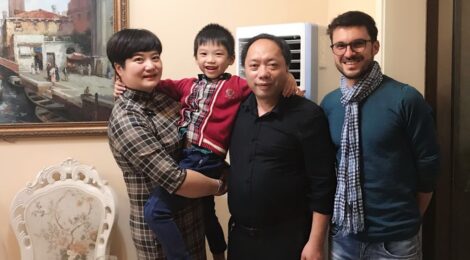
Galilei Circle of Friends – Interview with Simone Corsi

Simone Corsi is an Assistant Professor in Strategy and Innovation at Loughborough Business School in the UK, where he conducts research on international innovation flows between emerging and advanced economies. He got a PhD in Management from Scuola Superiore Sant’Anna, focusing on reverse innovation from China. Prior to joining Loughborough University, he worked for Lancaster University and the University of Manchester supporting business and research collaboration between the UK and China and advising companies on their China strategy.

PERSONAL RELATIONSHIP WITH CHINA
How did your experience with China begin? Was it by chance, work-related, or for pleasure?
My first actual encounter with China was in 2007. It was a one-month trip that started from Beijing and took me to a variety of sceneries from major cities to minor towns and countryside. At the time I was already interested in and had travelled to Asia, but as a student in economics I could not avoid being intrigued by fast-growing China. During that trip I also landed in Chongqing. I arrived there by boat, travelling on the Yangtze river from Yichang. I remember arriving at night, after hours of darkness and ‘nothing’, docking at this explosion of lights and wondering “where am I?”. It felt like being on the set of “Still Life (三峡好人)”. A bang bang offered to take my luggage up from the dock but I was backpacking so I had no need for that. One of the things I did during that visit was to go to the Three Gorges Museum. At the entrance, I was greeted by two university students that offered to be my guide for free, in exchange for the opportunity of practicing their English. I invited them for dinner that night (my first hot pot!) and we are still in touch to this day. That was Chongqing back then.
How has your relationship with China evolved over time?
I came back from that trip thinking that that was it, that would be my future. In fact, it was the beginning of a significant part of my career and, most importantly, life. Soon after coming back I started attending an advanced course on Chinese economy and law at the University of Florence in Prato and I went for another trip to China and a 3-month internship at the GGII in 2008. I then obtained a PhD in Management at Scuola Superiore Sant’Anna, focusing on innovation from China and doing my field research while visiting Tongji University in Shanghai for 6 months in 2011. After a short post-doc window, I left Italy in 2014 to join Lancaster University in the UK and manage their Lancaster China Catalyst Programme. There, with a team in Lancaster and one in Guangzhou and funding support from both the UK and the Chinese government (it was the so-called UK-China golden era), we supported UK SMEs in setting up R&D partnerships in Guangdong Province. Until then my perspective was purely business and business policy-oriented. In 2018 I joined the Manchester China Institute at the University of Manchester and I was exposed to a much different perspective of China’s politics and international relations. I had the opportunity to work with scholars from all over the world that focused on a variety of research fields: from Hong Kong and Taiwanese studies to US-China relations and political psychology. It was an intellectual heaven. But my role was mostly management. I missed the research angle, so I joined Loughborough University as a Lecturer in Strategy and Innovation in 2019. China remains inevitably very prominent in my lectures.
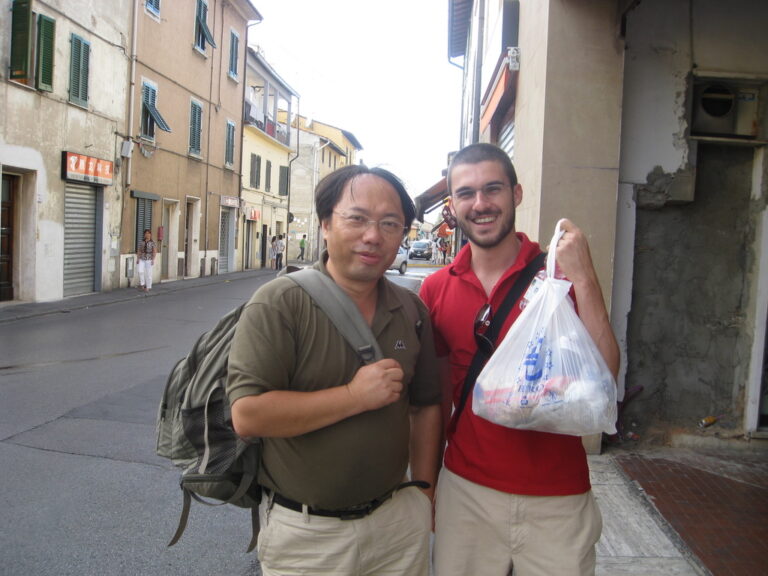
Taking Prof Pu (Chongqing University) to Prato’s Chinatown (2008)
What has your personal experience in this splendid country taught you?
In a very opportunistic and personal story kind of way, China gave me the opportunity to reinvent myself. It showed me the amount of opportunities available in the world and it gave me the confidence necessary to try and grab at least one of them.
It also taught me that those opportunities are only realizable with a lot of hard work and dedication (and the more than occasional failure). Until my experience with living in Chongqing in 2008, I had only lived in small village in the province of Florence. Chongqing, and the people I met in relation to that experience in 2008 both in China and in Italy, gave me the confidence to pursue whatever I wanted. I could fail of course, but the journey would have been worth it anyway.
PROFESSIONAL EXPERIENCE
How has China changed compared to its early years from a business perspective in your specific sector? What are the differences that have struck you the most positively and negatively?
I have always worked for the higher education sector but in two different countries so it is difficult to draw general conclusions in this sector. Although we can certainly say that Chinese universities have been constantly rising in international relevance both from a research and overall reputational perspective.
With regards to my area of research – innovation – China has changed significantly. When I first started looking at China as a location for foreign R&D and innovation while writing my PhD proposal in 2009, there were only a few studies looking at this. Max von Zedtwitz was one of the few scholars investigating foreign R&D in China and the discourse on low-cost R&D was still very prominent. That has changed significantly now. China’s relevance both in terms of innovation inputs (i.e. R&D investments) and outputs (i.e. patents) is apparent and has been growing significantly and constantly over the past 20 years. And there is no doubt that the future development of some key technological areas such as fintech or AI, just to name two of them, will happen in China rather than someplace else.
The strengthening of the Chinese economy and society has gone in parallel with a nationalist assertiveness that has characterized Xi’s tenure and this has, and still is, at times, caused frictions in its relations with the rest of the world. This has of course had an impact on the higher education sector as well.
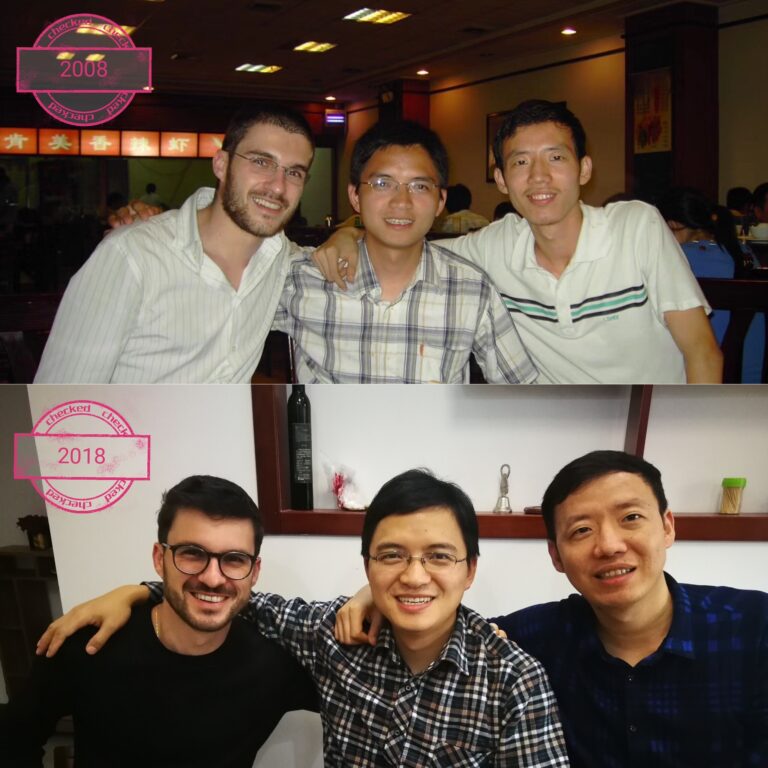
2008-2018: 10-year reunion with Dan and Li
Tell us about your experience in China and in particular at the Galilei Institute. What was your role and how has it evolved over time? How did you get in contact with Chongqing University and the Institute and who were the key figures?
As I mentioned, after I got back from China in 2007, I enrolled in an advanced course on Chinese Economy and Law at the University of Florence. At the same time, I was a master student there and my dissertation supervisor, Professor Simone Guercini, aware of my interest in China, put me in contact with Professor Nicola Bellini, at the time the director of GGII. Nicola very kindly offered to host me at GGII. It is un understatement to say that this opportunity changed the course of my life for the better. So I am very grateful to both Simone and Nicola. It was early days for the GGII. It had been founded just a few months before and it was still to be built. I was the first non-teaching intern so it was not clear what I was supposed to do. It was clear to me though: soak in the experience. And it completely changed my life. At the time I had never lived outside of Italy. I had never lived outside of the small village where I was born and raised outside of Florence. And all of the sudden I found myself living in this massive, hyper-dynamic, and fast-moving megalopolis. My English was still broken then, but it really didn’t matter. Hardly anyone spoke English in Chongqing in 2008. My apartment was on the 8th floor of an old building just outside Chongda Zhong Men. To enter it, I had to pass through the kitchen of my neighbour. For someone who was reading avidly on Chinese contemporary history, this arrangement was just gold. I felt like I was living in a dream, in a novel. The challenges were constant. Language, culture, ways of doing things…but I was so curious and everything was so interesting that each challenge was a reason to get more excited. In May 2008, a massive earthquake shook the Sichuan province and Chonqging. An incredible human tragedy…yet again, living through that on the ground was an incredible learning opportunity. After that experience, I was even more convinced that that was my future. And the following year, 2009, I got a scholarship to do my PhD at Sant’Anna, under the supervision of Professor Alberto Di Minin (current GGII Director). Even though I hardly had any data collected for my PhD in Chongqing, I kept finding an excuse to go back. Last time I was there was in 2018, to give a couple of seminars at the university and meet with old friends. Now, after 5 years, I am on the lookout for my next opportunity to visit.
How important is it to know the local culture and language in your relationship with China?
I don’t speak Chinese and I consider it a major setback – and one of my greatest regret (but never say never) – in developing a stronger relationship with China. However, I find that a humble and curious attitude has gone a long way in establishing strong partnerships in China over the years. In particular, knowing Chinese history has proven an extremely useful ice breaker and means to gain the trust of your Chinese counterpart. Not necessarily to debate a particular period in history but 1) to show appreciation of Chinese culture; and 2) to be aware and appreciate behaviours of Chinese partners that may seem odd or, worse, aggressive, to an uneducated interlocutor.
Living in the UK and having worked for 3 British universities, I am always shocked by how little British students know of historical relations between the UK and China. Especially with regards to the so called ‘Century of Humiliation’, which is so engrained into Chinese students’ memory and awareness. This does not help in fostering a fruitful and reciprocally respectful relationship.
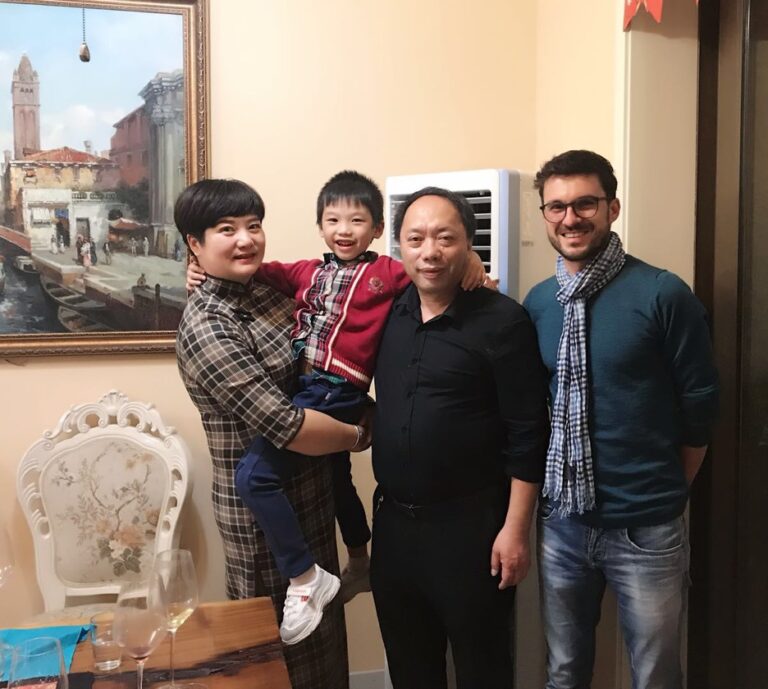
Prof Pu’s paintings: dinner at Prof Pu’s home in 2018
What were the main challenges you encountered in your successful experience in Chongqing? What were the positive surprises?
In a work context, I found Chongqing no different from the rest of China. I experienced Chongqing at the beginning of my Chinese adventure and I was simply too much in love to perceive the challenges I was facing as a problem. It’s incredible how a positive attitude can change your perspective on the world. As my relationship with Chongqing (and the rest of China) matured, I guess one of the most challenging things was to anticipate what a ‘tacit rejection or refusal’ on my Chinese partner’s side translated into. Chinese partners are extremely good negotiators and one of the levers they use is to present you with an odd status quo to deal with at the very last minute. This is often a result of them being unable to say ‘no’ to one or more of your requests. And you have to learn to deal with it or, better still, to anticipate it and avoid it.
When did you come back to Europe? From a professional point of view, was the experience in China useful for you? If yes, how?
Most of my professional and scholarly career has focused on China and I believe that is still my most recognizable trait if you look at my profile. Spending time in China, whether it was for a few months or a few days, was absolutely vital to understand the country better as well as gaining credibility towards audiences or potential employers.
Has China remained in your life and in your professional career? Have you had the opportunity to develop academic collaborations with Chinese colleagues?
As mentioned, China has determined most of my career and is still very much part of it. Curiously though, I have never developed strong collaborations with academics. I believe my only Chinese co-author has been Professor Xiaolan Fu, an economist based at Oxford University. Fair to say though that I only became a mature academic a few years ago, just before the pandemic hit. So that will have played a role in not having developed collaborations with academics based in China. I have however developed strong collaborations with Chinese academic institutions for the purpose of running ITA-China or UK-China academic or business support programmes.
How has the pandemic affected your collaborations with China and what strategies have you implemented to respond to the crisis?
My last trip to China was at the end of 2018 for a series of lectures and seminars I gave in Guangzhou, Xi’An and Chongqing, while I was manager of the Manchester China Institute. A year later I went back to being an academic, working at Loughborough Business School, and shortly after that the pandemic hit. After year of regular trips to China, not being able to travel there was quite a shock. However, so were the many other limitations to our lives imposed by safety. In this context, I ‘distracted’ myself by focusing on projects that were not dependent on my travelling to China (or anywhere else). I had data collected in China from previous years and I could work and write with them. Furthermore, I could conduct interviews with China-based executives online. Coincidentally, I am still in contact and have interviewed at least two of your previous interviewees: Marco Martini from Piaggio and Lorenzo Maffioli from Itema. I met both of them during my 2008 internship in CQ. Marco has remained a great friend since then. Someone I very happily detoured for during my China visits, just for the sake of having dinner and a heated discussion together. I only recently reconnected with Lorenzo and it struck me how he perfectly remembered when we first met (i.e. a dinner organized by GGII for the Italian community in CQ). I was a student intern, he was a senior executive for Iveco. I have of course maintained contacts with all my Chinese friends, updating and helping each other during these challenging years.
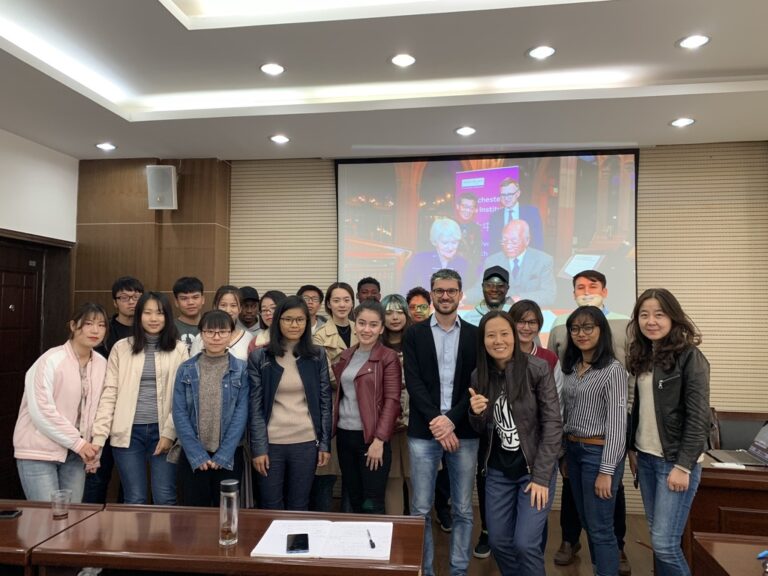
Lecturing in Xi’An
GOING EAST – Why does being in China still make sense for a European university?
Why does it still make sense to focus on the Chinese market for a European academic institution, and based on your experience, what are the opportunities that China can reserve?
Having worked for British universities for the past 10 years, I believe there are at least three reasons that make China an interesting partner:
- Research collaborations: China has been growing its academic and scientific power for the past 30 years and this is apparent in outputs such as publications, conference attendance and patents. Universities continue to grow; several Chinese universities are now ranked very highly internationally and more will come.
- Business support: this is based purely on my professional experience as I have seen how universities and their international networks can provide an internationalisation platform for SMEs. This is especially true for a complex and distant market like China, which ever more focused on attracting advanced technology, very often stemming from university research or university-industry collaborations.
- Students: the UK higher education sector is highly (maybe too riskily?) dependent on Chinese students travelling to the UK for their studies. The international fees they pay are often used to subsidize the education of domestic students. Being able to continue to attract them, and possibly exploring new Chinese geographies, remains central for British universities.
Of course while the above are great opportunities, they are not free of significant risks.
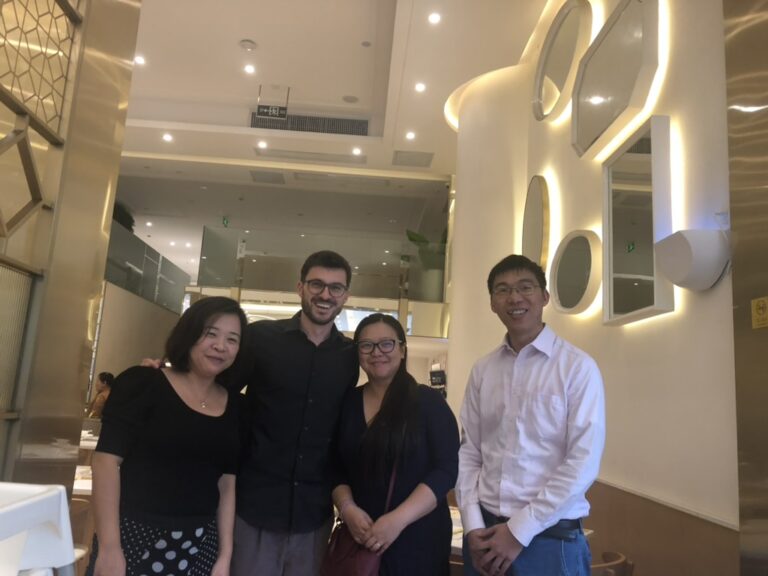
With the China-based team of the Lancaster China Catalyst Programme (Guangzhou)
Why do you think Chongqing is an interesting destination for universities?
Over the past 15 years, I have seen CQ (and CQ University) develop at an incredible pace. It became wealthier, more industrialized, more tech-oriented and certainly more internationalized. However, it maintains a level of Chinese ‘provincialism’ that somehow relegates it to a less attractive position for international partners. I believe that while this is a bit unfair, it represents a great opportunity for those international institutions that are still finding their feet in China. Chinese coasts can be very crowded places for developing partnerships, CQ still offers a relatively untouched and open environment.
Do you have a particular story that you want to tell us and that has remained in your mind during your experience in Chongqing?
Like anyone who has experienced China for more than a trip, I have so many of them! But I think my friendship with Zhou Dan (at the centre in the photo) represents the best of my experience with China. Dan was a student in engineering at CQ University and he visited Italy for 1 year in 2007 as part of an agreement between CQ University and Scuola Sant’Anna. I met him in 2008 when I went to CQ for my internship and we immediately became close friends. He was from a humble background, with no money to waste. I was instead the privileged one, going to China with a strong currency in my pocket. Dan impressed me for his dedication to his studies, aiming to be the best in his class while always finding the time to help me navigate my Chinese life. After graduation in 2008, he was immediately recruited by Zongshen. Two years later he would tell me over dinner how he was leading on the design of a new aero engine. We met several other times during the years but the best reunion was in 2018. Then the CEO of Zongshen Aero Engine, one of Zongshen’s subsidiaries, our financial positions were reversed. A perfect representation of modern China: challenging but fast-growing and opportunity-rich. In 2020, while China was recovering from the first wave of Covid and Italy was being hit hard by Covid-19 and mask shortages, he arranged for 200 masks to be directly shipped at my parents’ home. Another perfect representation of Chinese culture: relationships. I would love to travel to CQ this year to celebrate our 15 years of friendship!
Interview by Marco Bonaglia



